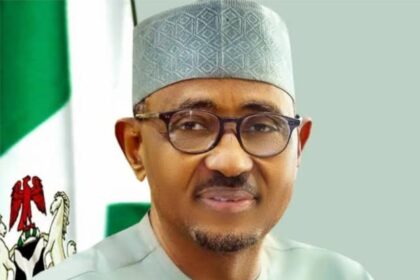Former President Olusegun Obasanjo commended some African leaders during a major speech on leadership at Oxford University on Monday but left out the president of his own country.
The former president named three African countries whose leaders, he said, are taking progressive economic measures and recording giant strides in line with the demands of the 21st century.
He specifically cited President Allassane Ouatarra for “focusing on transformative potential in Côte d’Ivoire.”
Mr. Ouatarra took immmeidate steps to heal the country following the violence that greeted his election in 2011, Mr. Obasanjo said.
Over 3,000 deaths were recorded in the post-election violence that hit the French-speaking West African country after the incumbent Laurent Gbagbo refused to step down, citing irregularities in the polls.
But the international community, including ECOWAS, rejected Mr. Gbagbo’s claim, which had initially been affirmed by the country’s constitutional court, and recognised the victory of Mr. Ouattara, then leader of the opposition.
Mr. Ouattara was subsequently inaugurated as president. He won a re-election in 2015 with 84 per cent of the votes.
Mr. Gbagbo was arrested in April 2011 and was transferred to the International Criminal Court where he has been facing charges since 2016. He pleaded not guilty to all charges, which include murder and rape.
Mr. Ouatarra “changed the narrative to get ahead of the economic curve by posting a double-digit GDP growth, exporting electricity to neighbouring Ghana and Mali and exporting processed versions of Ivory Coast’s rich raw materials and agricultural produce like cocoa, cotton, rubber and palm oil and making his country live with the largest percentage of middle class market in all of Africa,” Mr. Obasanjo told his audience at the Africa Initiative for Governance at Blavatnik School of Government.
Mr. Obasanjo said deep economic literacy had long been identified as a key requirement for any African leader to implement pragmatic economic solutions.
“It is not surprising that at the commanding heights of the economies doing well in Africa today are some of the best economic managers who had proven their mettle in major international financial institutions and focused professionals who know their onions,” Mr. Obasanjo said while listing Rwanda and Ethiopia as the two other countries doing well alongside Côte d’Ivoire.
It was not immediately clear why Mr. Obasanjo left out Mr. Buhari, whom he backed for president during the 2015 elections.
But Monday’s speech was not the first time Mr. Obasanjo would decline to see Mr. Buhari as an economic heavyweight.
In a September 2017 interview with African Arguments, Mr. Obasanjo scolded Mr. Buhari for not doing enough to stymie the country’s growing unemployment crisis.
If “youth empowerment, skill acquisition and youth employment – education are provided, the ticking bomb of possible youth explosion out of restiveness and anger will subside,” Mr. Obasanjo told the Liberia-based publication.
Similarly, during an interview he granted to a restricted number of journalists, including PREMIUM TIMES in February 2017, Mr. Obasanjo pointedly stated that Mr. Buhari was not strong on economy.
“In my book, I have said that Buhari is not strong on the economy and I did not write this to run him down,” Mr. Obasanjo said in the interview which held as part of his 80th birthday celebrations.
The National Bureau of Statistics estimated in December that 7.9 million Nigerians lost their jobs between January 2016 and September 2017, sending the unemployment rate north of 18 per cent.
But Mr. Obasanjo praised the exploits of Mr. Buhari in other areas, including where he had hitherto thought the president might not do well.
“I also used to think that he is not strong in the area of foreign affairs, but I have realised that he has improved very well,” he said. “He has actually done his best in the areas where we know him to be strong.”
It was also not immediately clear how Mr. Obasanjo’s latest omments would be seen by Mr. Buhari, who has already commenced groundwork for re-election.
Presidential spokespersons Garba Shehu and Femi Adesina did not respond to PREMIUM TIMES requests for comments Tuesday morning.
It emerged last Wednesday that the president had appointed Rotimi Amaechi, his minister of transport who ran his campaign in 2015, as the director of his 2019 campaign.
The move was immediately seen by the president’s critics as insensitive and diversionary, especially since Mr. Buhari had barely returned to work in August, having spent several months on a sickbed in London.
His supporters, on the other hand, see the president as an achiever who should be compensated with a second term.
Mr. Obasanjo has not openly disclosed his preferred candidate for president in 2019, but the election is widely expected to pit Mr. Buhari against Atiku Abubakar, a retired Customs officer-turned-businessman who served as vice-president throughout Mr. Obasanjo’s tenure.
Mr. Obasanjo led Nigeria between 1999 when the country returned to civil rule and 2007, heralding the first civilian-to-civilian transmission of power since the country attained independence in 1960.
His tenure was largely deemed an era of substantial economic growth for the country, which had languished under the whips of successive military juntas in the preceding decades.
The introduction and liberalisation of mobile telecommunication, increased volume of international trades and implementation of debt reliefs were amongst the key economic strides that drove the economic growth under Mr. Obasanjo.
But endemic corruption and human rights abuses were largely adjudged to have been left unrestricted during Mr. Obasanjo’s tenure, although he established anti-graft agencies and improved public funding for the human rights commissions.
Mr. Obasanjo said Africa should position itself for at least 25 per cent of foreign direct investment.
“Only $55 billion came to Africa” out of about $1.6 trillion in foreign direct investments in 2016, when the continent should have canvassed at least $400 billion, he said.


